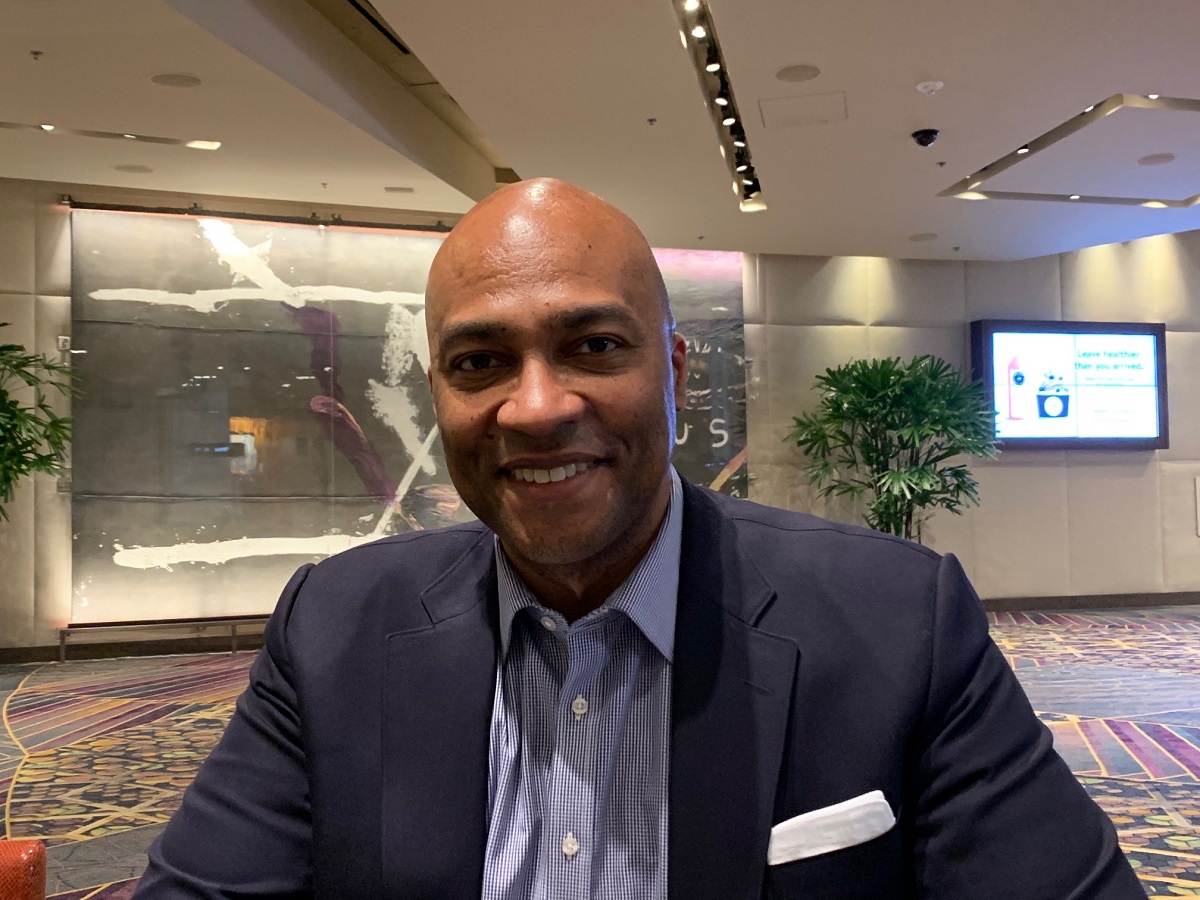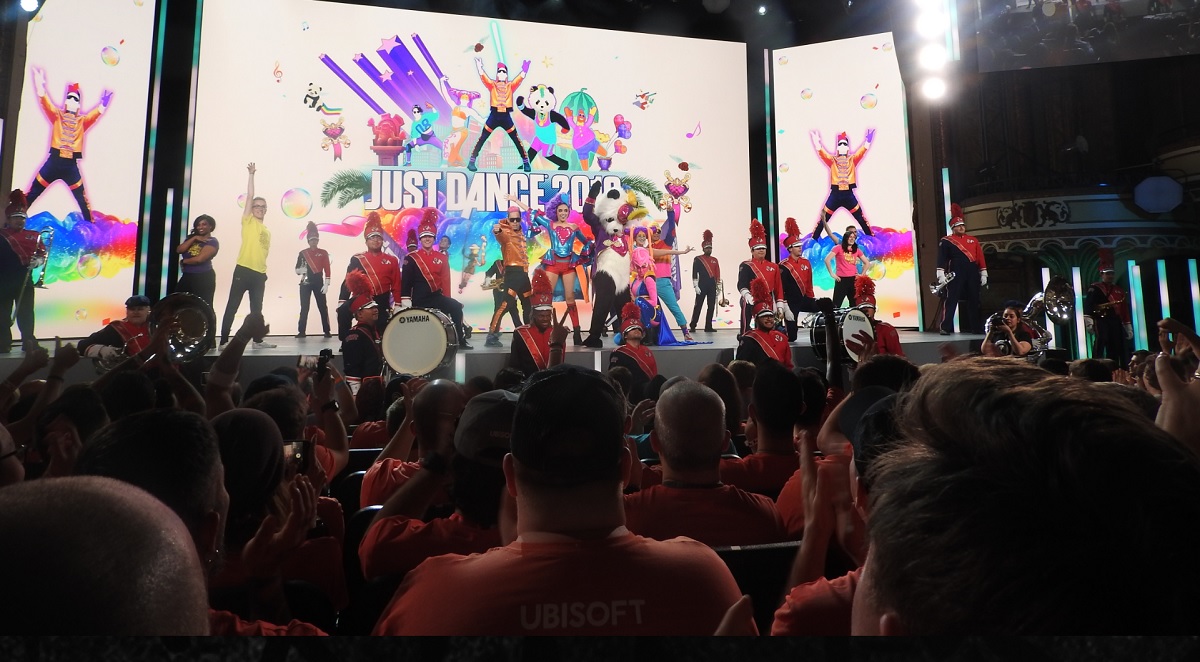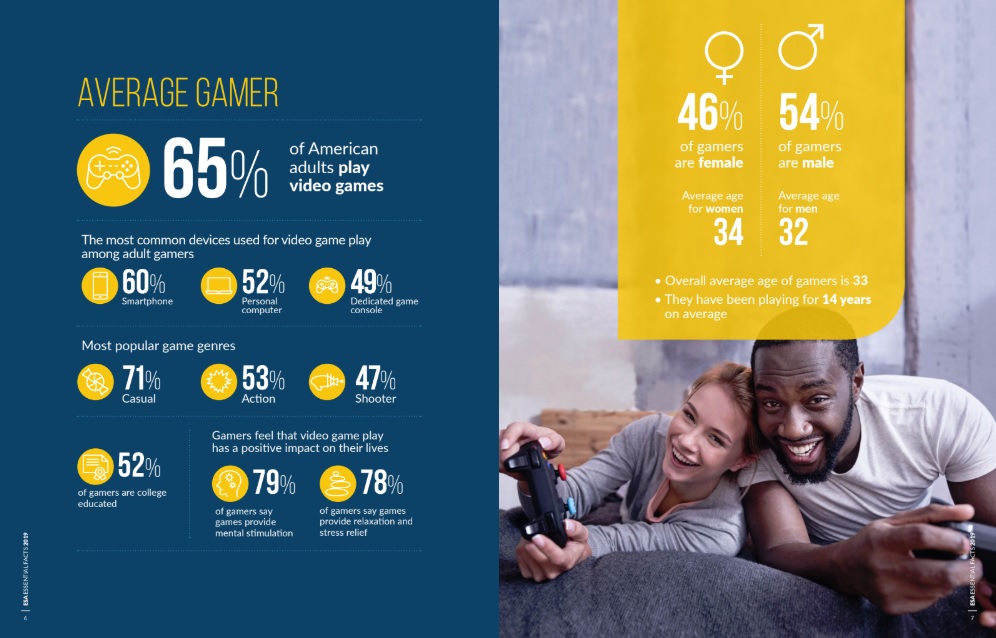The Entertainment Software Association, the game industry’s lobbying group and the creator of the big E3 trade show, named Stanley Pierre-Louis as its new president and CEO. We talked with Pierre-Louis about how he stepped into the roll last fall after the departure of longtime CEO Mike Gallagher.
It’s a big job, as the ESA represents the game companies that generate $43.4 billion in annual video game sales in the U.S. Pierre-Louis has to make sure that the ESA does a good job with the Electronic Entertainment Expo (E3), coming up in early June. That means making sure the cavernous Los Angeles Convention Center is full of exhibits, game industry people, and fans.
Pierre-Louis will now serve as the chief spokesman for the industry, which serves more than 164 million adults who play video games in the U.S. That means he has to deal with criticism of the industry in the wake of shootings such as Christchurch, and he has to help fend off the classification of video game addiction as a medical condition by the World Health Organization (WHO).
Pierre-Louis spoke at our recent GamesBeat Summit 2019 event in April in a fireside chat with Keisha Howard on screen time and video game addiction. I’ve embedded that video in the post. And I’ve also included the edited transcript of my interview with Pierre-Louis, who was previously general counsel for the ESA.
June 5th: The AI Audit in NYC
Join us next week in NYC to engage with top executive leaders, delving into strategies for auditing AI models to ensure fairness, optimal performance, and ethical compliance across diverse organizations. Secure your attendance for this exclusive invite-only event.
Pierre-Louis is a Phi Beta Kappa graduate of Clark University. He earned his law degree from the University of Chicago Law School, where he also served on The University of Chicago Law Review’s Board of Editors.
Here’s an edited transcript of our interview.

Above: with Stanley Pierre-Louis, Acting President & CEO of Entertainment Software Association and moderated by Keisha Howard, Founder of Sugar Gamers – Details – Boss Stage
GamesBeat: You’ve been doing the job for a while now.
Stanley Pierre-Louis: It’s an exciting time to be in this role in particular.
GamesBeat: And it’s just in time for E3.
Pierre-Louis: It really is. E3 is so important to our industry. This year is shaping up to be one of the most exciting in years. It’s an opportunity for our industry to tell the world what’s new, but also to reflect what we’re learning from our audiences.
GamesBeat: How does the show look right now? Is it in good shape? I know you’re Sony-less this time.
Pierre-Louis: It is shaping up to be one of the most exciting shows in recent memory. A lot of announcements to be made, but also some reveals that are already occurring. There’s a buzz around this year. Using the momentum from last year and some of the announcements you’ve seen over the course of the year, it’s going to culminate in a magical week for our industry.
GamesBeat: What are some of your priorities? Have you figured out what you want to accomplish as CEO?
Pierre-Louis: I view our role at ESA as being the voice and advocate for the video game industry. What that means is expanding and protecting the dynamic marketplace for video games to thrive. My goal is to do everything we can to ensure that those opportunities exist. ESA focuses on the public policy aspects of that advocacy, and so our role is to ensure that policymakers at the federal, state, and local levels understand what we bring to the table.
Our industry is the benchmark for job creation, innovation, freedom of expression, audience engagement, and consumer protection. When we tell our story to policymakers and to our audiences more broadly, they’re excited and proud of what we do. It’s not a story that gets told a lot, so we’re going to focus on making sure we’re telling that story to all of our audiences, and especially policymakers.

Above: ESA acting CEO Stanley Pierre-Louis.
GamesBeat: Are you approaching some of these by taking them head-on? That seems to be how you’ve approached the game addiction issue.
Pierre-Louis: We view all the issues of the day as opportunities to create allies and have people understand what we’re doing. Let’s take screen time. Screen time has been a discussion point for some time among policymakers. We have a great story to tell, because there are two aspects to what we do to inform and enable consumers to manage screen time. One is through ratings. We’ve been self-regulated for 25 years through the ESRB. That provides consumers, and especially parents, with information about games, discussion values, and other resources.
We also have devices with tools to help manage time spent, money spent, internet access, you name it. Being able to share that with policymakers gives them a lot of confidence that we take our responsibilities seriously. In fact, the Federal Trade Commission has applauded our industry as the best among the media sectors in terms of self-regulation.
GamesBeat: What are some other big issues for you right now?
Pierre-Louis: Obviously E3, which we talked about. We talked about screen time. This summer there will be a workshop hosted by the FTC on loot boxes. We’re looking again to share with those policymakers and regulators information about what we do to provide parents with the tools they need to manage screen time, to manage spending, and to manage overall usage. We believe that video gaming is and always has been part of a healthy, well-balanced lifestyle. Video gaming is something that enhances the way we work, play, and live.

Above: The Just Dance dancers at Ubisoft’s E3 2018 press event.
GamesBeat: How do you look at the big platforms coming in, things like Google with Stadia, to be bigger participants in games?
Pierre-Louis: From our perspective, increasing the opportunity for video games to reach consumers is a good thing. We’re excited about developments that enhance the ability for consumers to reach more games. We’ll have to learn more about how these platforms are developing, but we view any opportunity to expand gameplay as positive.
GamesBeat: What’s helped you get ready for this job?
Pierre-Louis: What fuels me here, it’s a few things. One is the energy and the dynamism of our industry. We have exciting products to talk about, exciting experiences, exciting devices that get created. We’re telling great stories. Looking at our recent essential facts, some of the information we’ve shared about the video game population is amazing. 164 million American adults are playing video games. That just goes to — more people are playing, more people are playing together, and more people are playing for more reasons.
More people are playing together. 63 percent of video gamers play together in some way, shape, or form. If you extrapolate that to the worldwide number of gamers, which is 2.6 billion, that’s a lot of interconnected people. We’re doing that as an industry. And more people are playing for different reasons. Some people are playing for fun. But 78 percent of people play for relaxation and stress relief. 79 percent of people play for mental stimulation. It’s an exciting time to be in the industry because we’re reaching people in different ways.
The other thing I would say is we have a fantastic team at ESA. Everyone loves what they do, and they love doing it for this industry. It’s exciting to work with a group that’s so inspired by what our industry does, because they enjoy video games and they enjoy the advocacy we do for our industry.
GamesBeat: I’ve seen some stories other publications have done about the work environment at ESA. I wondered if you’d address that as well.
Pierre-Louis: We have an exciting, dynamic work force here at ESA, dedicated and cohesive. We have great esprit de corps as a group. We’re excited about the challenges and opportunities that lie ahead.

Above: Microsoft at E3 2018
GamesBeat: How do you, as a leader, help set the right way to work or the right tone for the workplace?
Pierre-Louis: The first thing you do is ensure that everyone knows they have a voice in our direction. We work together, collaboratively. You want input. I’ve certainly been taking input over the last seven and a half months as the acting CEO. Second is to have an open door, to ensure that people feel like they can voice those concerns, but also to bring in ideas. That’s the biggest piece, unleashing the ideas that people have. Saying, “Let’s try that” and seeing what works. We collaborate well with our members. We collaborate well internally. All those goes to helping our industry move forward.
GamesBeat: How do you make your board happy?
Pierre-Louis: Staying focused and on-mission. They understand that our chief role is being the voice and advocate for our industry, particularly with policymakers. That means staying focused on the issues that provide opportunities to tell our story. E3 clearly is an opportunity to tell the industry’s story from the industry’s perspective, but so are some of these other opportunities coming down the pike, like with the FTC workshop. I think our board is very focused on ensuring that we’re providing a landscape for them that expands and protects their opportunity to thrive in the marketplace.
GamesBeat: One thing that was different when Mike started, and now when you’ve taken over, is where social media is. I thought it was interesting that when Reggie retired, he opened up a Twitter account. I wonder if ESA’s engagement with social media evolve or be different in your tenure.
Pierre-Louis: We’re always looking for ways to reach new audiences and different audiences. We’re going to use whatever leverage we can to get the word out about how great our industry is.

Above: ESA
GamesBeat: Are you going to tweet about 30 times a day?
Pierre-Louis: [laughs] I’m going to stay focused on the work we have and make sure we get our message out in the most effective way possible.
GamesBeat: Do you have any favorite games at the moment, anything you’re playing?
Pierre-Louis: I’m playing Super Smash Bros. Ultimate with my 12-year-old. Not well. [laughs] That’s what I’ve been playing most recently.
GamesBeat: On your data, and I think the Newzoo folks called out an interesting figure, they said that 46 percent of hardcore gamers are women.
Pierre-Louis: And that aligns exactly with our data. Our data matches with theirs. It was taken separately, but they came up with a similar figure to ours. Our numbers say 46 percent of gamers are women, average age 34.
GamesBeat: That seemed surprising, given where the industry has come from.
Pierre-Louis: Certainly the introduction and the expansion of mobile games and casual games has had a very positive effect on expanding the demographic of games, particularly with women.
GamesBeat: “Hardcore” isn’t who you’d expect it to be.
Pierre-Louis: It’s a more male demographic, but if we look at the overall pictures, yeah, it’s 46-54.
GamesBeat: How do you look at the health of the big companies in the game business right now? Does it look like they’re as strong as they’ve been, or do you think they have challenges to deal with?
Pierre-Louis: When we issued our last report on where we are as an industry, we were at $36 billion. The most recent release we had this year was $43.4 billion. We are still an industry that is growing and expanding and creating new fans and new experiences for all of our audiences. Our industry has not been afraid to challenge the current orthodoxy, and sometimes even disrupt its own success to get ready for the next challenge. It’s exciting to know that our industry wants to stay ahead of all the trends to ensure that tomorrow’s audience is being thought of today.
GamesBeat: Where do you think the most interesting areas for innovation are right now?
Pierre-Louis: They’re really everywhere. Innovation is one of our calling cards as an industry. We’re not only market leaders in creating innovation, but we expand the use of PCs on a yearly basis as we try to enhance what gameplay feels and looks like. Same with consoles. You’re also seeing a lot of work put into VR/AR/MR. There’s a lot of innovation going on there as well, with companies like Magic Leap and Microsoft with their HoloLens. You’re seeing innovation on every device, and even on the devices we’re used to. I see it going everywhere, because gamers are everywhere.

Above: Tactical Haptics controllers let you dual wield guns in VR.
GamesBeat: What do you think of the publicity around labor unions and crunch time lately?
Pierre-Louis: Our member companies strive to have the most productive and healthy workplaces, because that’s where you get the quality games that we produce and the quality devices we manufacture. I think that the current conversations around unionization are really within the purview of companies and their employees. But what I do know is that they are working diligently to create an atmosphere where the next generation of games will be better than the one we have today.
GamesBeat: How do you feel about how well the industry is doing at creating jobs in the U.S., and in specific regions in particular?
Pierre-Louis: I mentioned before that we’re really the benchmark, the standard-bearer in job creation, innovation, and creative expression. Job creation is significant because there are something around 220,000 people who work in some way in the video game industry. We’re looking for even more workers, because making these games requires high-level skill sets. We want to grow more American workers, but we also need to bring in talent from overseas as well to sustain the immense needs for our members to create games at a high level.
GamesBeat: Are there worries on that front around immigration policy?
Pierre-Louis: We, like many other industries, rely on talent in the tech field. We want to grow American talent and recruit from around us as much as we can. We also recognize that we need overseas talent to supplement our innovations.

Above: The ESA’s report on game jobs and companies in the U.S.
GamesBeat: Are there things that the U.S. can be more competitive in creating jobs relative to other countries, particularly someplace like China?
Pierre-Louis: We’re a global industry, and therefore expanding H1Bs, for example, would provide us with more opportunities to fill those jobs that on average pay $97,000 a year. We’re also watching with great interest at what’s going on with the current tariff wars. For us, it’s fair to say that the video game industry boasts a trade surplus for the American economy. Tariffs hurt the economy, hurt industry, and hurt consumers. Our focus is on trying to expand our economic imprint within the United States and globally.
GamesBeat: Are there particular ways you think you can be effective at interacting with the current administration.
Pierre-Louis: We work with policymakers at every level of government and in every political party to ensure that the video game industry has an opportunity to expand the marketplace for its audiences, and to reach its audiences.

